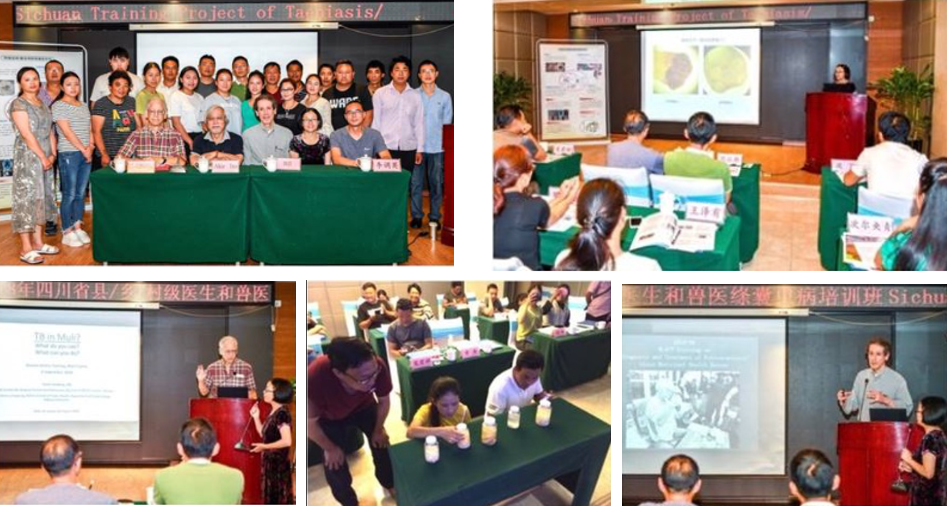On September 4-6, 2018, the Boulder-Lhasa Sister Cities Project collaborated with Dr. Li Tiaoying, Sichuan Center for Disease Control and Prevention (CDC), in Xichang, Sichuan, to train rural Tibetan medical doctors and veterinarians from Kham on the prevention of Neurocysticercosis.
Neurocysticercosis (NCC) is a dangerous parasitic disease that is highly prevalent in 24 counties in western and southern Sichuan Province of China (Kham). Symptoms include epileptic seizures, headaches, hydrocephalus, blindness, and death. The risk factors for this preventable disease are lack of education, free-ranging pigs, lack of meat inspection, a poor economy, eating undercooked pork, lack of latrines, poor hygiene, and lack of trained doctors.
When humans ingest raw or under-cooked pork infected with pork tapeworm larvae, adult tapeworms can develop in their small intestines. This human infection is called taeniasis. Each such infected human is a carrier for cysticercosis, which is caused by fecal-oral contamination from the carrier. Cysts may develop in skeletal muscles, the central nervous system (location that most frequently causes serious symptoms), or less frequently in the eyes, skin, or heart. In the central nervous system (most commonly the brain), the disease is called neurocysticercosis.
The Boulder-Lhasa Sister Cities project trained a total of 22 interested and attentive public health personnel:
- 4 village medical doctors from Shuiluo Township, Muli County, Liangshan Prefecture,
- 1 village medical doctor from Donglang Township, Muli County,
- 4 village veterinarians from Shuiluo Township,
- 1 township veterinarian from Shuiluo Township,
- 8 staff members from Muli County CDC,
- 3 staff members from Kangding County CDC, Ganzi Prefecture, and
- 1 township medical doctor from Kangding County.

Trainers and trainees in Xichang, September 4
[courtesy: Jason Zhang, Xinhua News Agency]

Dr. Li Tiaoying providing training [courtesy: Jason Zhang, Xinhua News Agency]

Trainees examining different species of tapeworm
The trainers were Dr. Li and three foreign experts:
- Dr. Bill Warnock, PhD, Project Leader, Boulder-Lhasa Sister City Project
- Prof. Akira Ito, PhD, Department of Parasitology, Asahikawa Medical University, Japan
- Dr. Stefan Goldberg, MD, US Centers for Disease Control and Prevention (CDC) (retired)
Dr. Li introduced general knowledge about the Taenia solium parasite, including the life cycle, risk factors for transmission, diagnosis and treatment of taeniasis and cysticercosis, and diagnosis and treatment of swine cysticercosis. She provided specific training on how to educate the local residents about NCC, how to detect taeniasis carriers, and how to detect swine cysticercosis. Taeniasis carriers are the infection source of NCC.
Therefore, detection and elimination of taeniasiscarriers is extremely important for the prevention of cysticercosis in humans and pigs. Dr. Li gave to each trainee two laminated photo sheets showing Taenia solium tapeworms and Taenia solium cysts in raw pork. She also brought from her laboratory in Chengdu actual samples of different species of tapeworms. Each medical doctor and veterinarian received a tabulated book for recording the names and locations of local residents whom they have educated about NCC and those who have passed Taenia solium tapeworms or whose butchered pigs have Taenia solium cysts.

Bill Warnock presenting “BLSCP: Fighting
Neurocysticercosis (NCC) in Sichuan, 2013-2018”
[courtesy: Jason Zhang, Xinhua News Agency]

Dr. Stefan Goldberg presenting
“TB in Muli? What do you see? What can you do?”
[courtesy: Jason Zhang, Xinhua News Agency]
The three foreign experts provided training to enhance that provided by Dr. Li. With their own perspectives and experiences, they interacted very well with the trainees, who appreciated the chance to learn from their presentations. Tuberculosis (TB) is also very prevalent and very dangerous in many parts of Kham. As an expert in TB, Dr. Goldberg was invited by Dr. Li to provide bonus training on TB.

Dr. Tsering Yangzom, medical doctor,
Dongla Village, Shuiluo Township,
educating local residents about NCC with
the two laminated photo sheets that she
received at the training in Xichang Shuiluo Township will benefit from our training. Through
All 6,000 Tibetan residents, including 1,300 children, will participate in mass screening by the newly trained medical doctors. Because the medicines for treating these cases are not currently available in Shuiluo Township, the experts did not provide training on treatments.
Dr. Li will treat the taeniasis cases with pumpkin seeds and areca nut extract and advise the families of those with cysticercosis regarding appropriate treatment with drug therapy or surgery. The veterinarians will advise local farmers not to eat pork with Taenia solium cysts. Dr. Li will also evaluate how the trainees are performing, answer questions, and continue the mentoring process.
Other Facts about this Project
- $28,074 was the estimated training budget on June 24.
- $23,574 was the estimated training budget on July 11 after Sichuan Provincial Government committed to pay for international air tickets for the three foreign experts.
- $20,976 was the estimated training budget on August 1 after Sichuan CDC committed to pay for the hotel expenses and most meal expenses in Chengdu and Xichang for the three foreign experts.
- $21,645 is the total amount raised, thanks to 50 different compassionate donors.
- $19,279 was the estimated training budget on September 3, due to a favorable exchange rate.
- $20,033.07 is the actual training cost total.
- $4,514.71 is the total cost of training materials plus hotels, meals, and transportation for the three foreign experts and the four Sichuan CDC staff members; this amount was covered by Sichuan CDC.
- $15,518.36 is the net training cost total paid by the Boulder-Lhasa Sister Cities Project.
- 25,800 RMB ($3,794.12 at the training project exchange rate of 6.80 RMB/$) is the amount of surplus
- BLSCP funds being held by Dr. Li, per Bill Warnock’s request, for future collaboration between the Boulder-Lhasa Sister Cities Project and Sichuan CDC, now under development for 2019.

